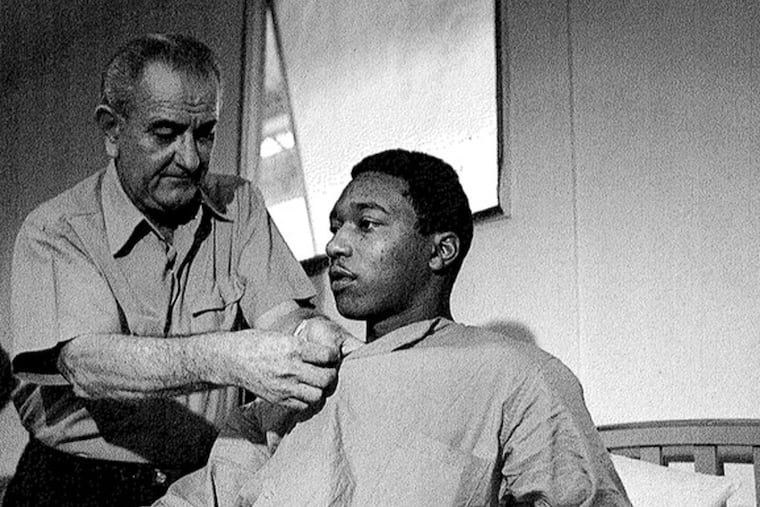Convicted twice and sentenced to death 3 times, a Norristown man goes on trial for a 4th time for the same murder
Three juries have upheld Robert Fisher’s guilt in the death of Linda Rowden, his ex-girlfriend. His recent federal appeal is forcing a fourth trial.

It was Norristown, 1980, and Robert Fisher was nervous. After returning home from combat in Vietnam, the 33-year-old turned to narcotics — he later told doctors they eased the symptoms of the PTSD he carried back from the jungle along with a Purple Heart for his service in the Marines.
But he graduated from client to associate, acting as a willing “enforcer” to a midlevel heroin dealer in Montgomery County’s largest borough, according to investigators.
Police believed he had killed for his boss, Nathaniel “Bootee” Coleman, allegedly silencing a federal informant named Nigel Anderson. And he was prepared to kill again to keep that a secret. Fisher shot Linda Rowden, his ex-girlfriend, twice in the head at point-blank range as she drove down busy Dekalb Street on July 10, 1980, police said. At the time, Rowden, 26, was cooperating with county detectives investigating Anderson’s death.
After seven years on the run, Fisher was captured and put in front of a jury. He was convicted of first-degree murder and sentenced to death. He successfully appealed, won a new trial and again was convicted and sentenced to death. Another appeal was successful and won him a new sentencing hearing, but a jury put him on death row for a third time.
Last month, after a 17-year appeal in federal court, Fisher’s sentence and conviction were again overturned. Now, prosecutors in Montgomery County are poised to try him for the fourth time for the same, nearly 40-year-old crime.
The decades-old case poses a particular challenge. Some of the witnesses from the earlier trials are dead, and in their place, lawyers for both sides will have to rely on transcripts of their previous testimony. That’s a handicap for the prosecution and defense alike because it deprives the lawyers of the opportunity to cross-examine the witnesses or challenge their credibility in front of a jury.
Witnesses who are available to take the stand face the obstacle of fading memories. And Fisher, at 73, may cut a more sympathetic figure than he did when he was first brought into the courtroom in 1988 as a decorated veteran turned violent drug-gang enforcer.
Fisher’s appeals were all won on legal findings of errors by lawyers and trial judges, mistakes that the appellate courts ruled compromised the verdict of his guilt and his sentence.
Experts in capital punishment such as Jules Epstein, a professor at Temple University’s Beasley School of Law, say that’s not uncommon in death-penalty cases.
“Death-penalty litigation is the brain surgery of criminal law," Epstein said. "Sadly, we don’t always have the right people handling the cases, so very often there are problems that cause a return decades after trial.”
So in the end, jurors with 21st-century sensibilities will have to decide whether the earlier jurors got it wrong — three times. This time, though, prosecutors are not pursuing the death penalty.
The federal judge who ordered the retrial ruled that prosecutors erred while arguing for that punishment in Fisher’s third sentencing, in 1997. It’s a moot point now anyway: Pennsylvania has a moratorium on the death penalty, signed by Gov. Tom Wolf in 2015.
First Assistant District Attorney Ed McCann Jr., who is handling Fisher’s fourth trial, said he is confident in the case, which he called a “brutal killing with clear indication of intent.”
A veteran prosecutor who worked for years in the Philadelphia District Attorney’s Office, McCann said the evidence against Fisher was compelling.
“I think the case is strong, in terms of evidence of guilt,” he said. “Multiple witnesses say that he did it, he talked to somebody after, one of his girlfriends, and admits it, and then he goes on the run for about seven years.”
McCann is also hoping for an outcome that finally brings closure to Rowden’s family, who he said has been deeply upset by the news of the coming retrial.
“That’s probably the toughest part of dealing with these issues that come back all these years later,” McCann said. “Those are really hard conversations to have, for people who maybe haven’t thought about the court process for a really long time. And in this case, it’s after almost 40 years, which is a pretty terrible thing to have to tell somebody, and a pretty terrible thing for them to endure.”
Carrie Allman, the chief of homicide trials for the Montgomery County Public Defender’s Office who is handling Fisher’s defense, said trying a case with such a complicated history could be difficult. The unavailability of some witnesses, in particular, she said, poses a “significant handicap to both sides.”
Like McCann, she said she’s aiming for a just conclusion to the case after so many years.
“Its been three times now,” Allman said. “And that’s a lot of time and resources. It might benefit everyone if we could find a resolution that’s fair and does not continue to take up the time and energy of the court system.”